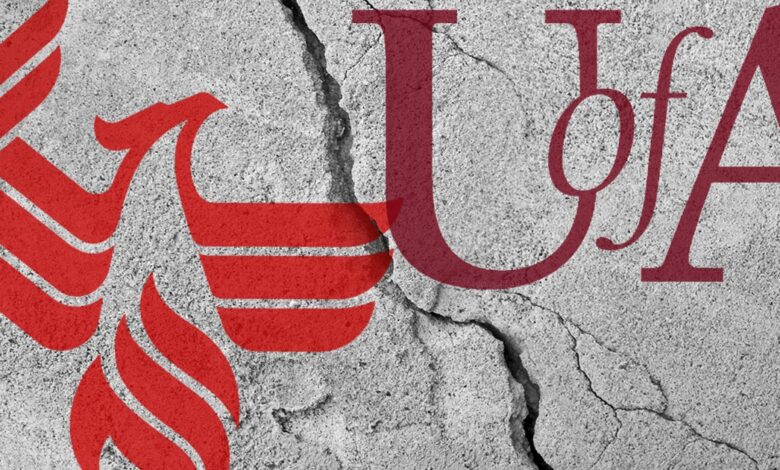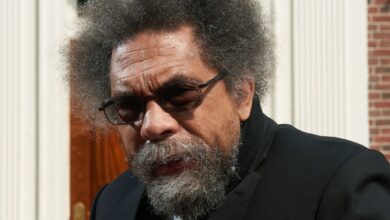U. of Arkansas System Trustees Say ‘No’ to Partnership With Prospective U. of Phoenix Buyer

[ad_1]
The University of Arkansas system’s Board of Trustees narrowly voted on Monday to reject a resolution supporting a future affiliation with the University of Phoenix, once the premier mega-university in the country.
In question was whether trustees would endorse the 70,000-student system entering into a formal agreement with Transformative Education Services, Inc. — a nonprofit looking to acquire the for-profit University of Phoenix and transition it to nonprofit status — for the purpose of sharing expertise, research, and technology. With roughly 65,000 full-time students and 140,000 students taking courses annually, Phoenix serves mostly online, adult learners, and is one of the largest remaining for-profit colleges in the U.S.
The board’s stamp of approval was not required, as the UA system itself would not be purchasing Phoenix. Still, the UA system president, Donald R. Bobbitt, had wanted the board’s weigh-in — and, optimally, its blessing — for a decision of this magnitude.
While Monday’s vote isn’t a death knell for a future partnership, “Dr. Bobbitt has previously said it would be difficult to move forward without support from the Board for this project. That statement remains true,” Nate Hinkel, director of communications for the UA system, wrote in an email to The Chronicle. “He is certainly disappointed in the outcome of the meeting.”
The board was closely split in a 5-4 vote, with one trustee, Kelly Eichler, abstaining. Proponents on the board like Col. Nathaniel (Nate) Todd underscored the strategic benefits of a partnership, including access to Phoenix’s online-education expertise and some $20 million a year in new revenue. Opponents like the board chairman, Morril Harriman, questioned whether an affiliation aligned with the UA system’s mission, and were uneasy that the board would wield no control over TES or Phoenix.

Further Reading
This striking division had been on display during a special session just days prior, when trustees heard from TES’ legal counsel and other acquisition experts, and spoke in greater detail about the arrangement. Their comments underscored the nuanced cost-benefit analyses more institutions are having to make as they work to secure sustainable streams of revenue and students.
As Michael Moore, the system’s vice president for academic affairs, told trustees at that April 19 meeting, “While this transaction is noteworthy because of the size of the institution … it is not unusual in the sense of what is happening in the context of higher education today.”
Making the Case
During last week’s special session, Moore laid out a dire reality to trustees: That the UA system is projected to lose 15 percent of its enrollment as soon as five years from now.
“The enrollment cliff is coming,” he said. “It is very real, and virtually all of our campuses are going to feel the pain from that.”
A $20 million-a-year payment from TES, then, would help cushion the blow. (While it’s reportedly TES’ intent to keep the University of Phoenix’s name intact given its brand recognition, it would pay the UA system to be able to promote the University of Phoenix as, for example, “a nonprofit affiliated with the University of the Arkansas system.”)
Beyond the financial incentive, the University of Phoenix has resources, knowledge, and connections the UA system could learn and benefit from, said Matthew Waller, dean of the Sam M. Walton College of Business at the flagship UA-Fayetteville. Phoenix is adept, for example, at building online degree programs “quickly and cost effectively,” he said. It boasts about 1,600 corporate partners. And it’s at the forefront of developing new technologies, including ones that closely track the skills and competencies that employers need most to inform the development of course curricula.
This seems like a lifeline to us.
While the system likely wouldn’t be getting those technologies for free, the point “is to ensure that the University of Arkansas system has opportunities for technologies in the education space right away, particularly as those technologies change pretty quickly,” said Julie Miceli, an education lawyer at the law firm Husch Blackwell who’s serving as legal counsel for TES.
For trustees like Eichler, the University of Phoenix’s experience in online learning was especially attractive.
“Online education is here to stay,” Eichler said. “That’s been demonstrated after Covid. … My son has 50 percent of his courses online. We’re going to have to get into this realm if we’re going to compete and if we’re going to stay afloat. … This seems like a lifeline to us.”
‘A Square Peg Into a Round Hole’
Still, the trustees Kevin Crass and Harriman struggled to wrap their heads around how the partnership would fulfill the system’s mission.
The UA system is meant “to improve the quality of life and the educational status of the people in Arkansas. To me, we’re losing some of that focus,” Harriman said, later adding: “I feel like we’ve been trying to fit a square peg into a round hole.”
Another sticking point for Crass and Harriman was governance. Specifically, that the board would have no control over TES or the University of Phoenix, with only minority representation on TES’ board. (After further exploration, Crass added during Monday’s vote that the UA system would have a “limited right to terminate” any agreement with TES before the 10-year mark, barring any violations of a deal.)
The structure “bothers me a little bit,” because “the more complex a machine, the easier it is to break,” Harriman said. He would’ve preferred a scenario “to bring Phoenix into the system itself; as a partner, as a component, as a division.”
This was a shared feeling among a few board members. But Arkansas’ constitution prohibits state entities, which include public institutions, from assuming or paying the debt or liability “of any county, town, city or other corporation” — taking a direct acquisition, and board control, off the table. Conversely, the system took on no debt when it acquired a smaller for-profit, Grantham University, in 2021.
The board’s vice chairman, Sheffield Nelson, had also expressed concerns with the University of Phoenix’s reputation — it notably shelled out $191 million in 2019 to settle a Federal Trade Commission complaint for deceptive advertising — and whether past or future wrongdoing could taint the system’s image. The Faculty Senate at the flagship University of Arkansas in Fayetteville shared similar concerns in a letter last month sent to Bobbitt (to which he responded).
Crass had identified one other possible “monster under the bed”: If the system and board members would assume any financial or legal risks through an affiliation.
Miceli, the legal counsel for TES, had confirmed with the board members that the UA system would not be financing, backing, or co-signing any component of TES’ intended acquisition of Phoenix, or taking on “any of its corporate liability, risk or ongoing obligations.” And in the case of any lawsuits against Phoenix, the UA system and its board members would have immunity from liability, punishment, or legal action.
Bobbitt underscored that a “staggering” amount of due diligence had been done to ensure any affiliation would benefit, not harm, the system.
“The monster under the bed is always more scary until you look,” he said.
Time Is of the Essence
It wasn’t clear on Monday just how much the board’s vote would influence Bobbitt’s decision regarding a partnership with TES. The nonprofit is moving quickly on its bid to acquire the University of Phoenix, though, per details shared at the April 19 meeting.
Miceli said TES’ immediate next step is to finalize its financing and the terms of an asset-purchase agreement with Apollo Education Group, which owns the University of Phoenix.
The deal is expected to be a clean break, marking a departure from some prior well-known acquisitions, like the University of Arizona’s 2020 purchase of the for-profit Ashford University. (In that case, Ashford’s owner, Zovio Inc., had stayed on in an online-program-manager capacity until the partnership was terminated last August.)
TES and the University of Phoenix will then apply for a “change of control” review with Phoenix’s accreditor, the Higher Learning Commission. Hinkel confirmed that the deadline to submit that review request is early May. TES will then also need to move forward with a pre-acquisition review with the Department of Education.
Reviews are expected to take about six months, Miceli said. With “appropriate approvals,” the transaction would look to close toward the end of 2023.
[ad_2]
Source link






